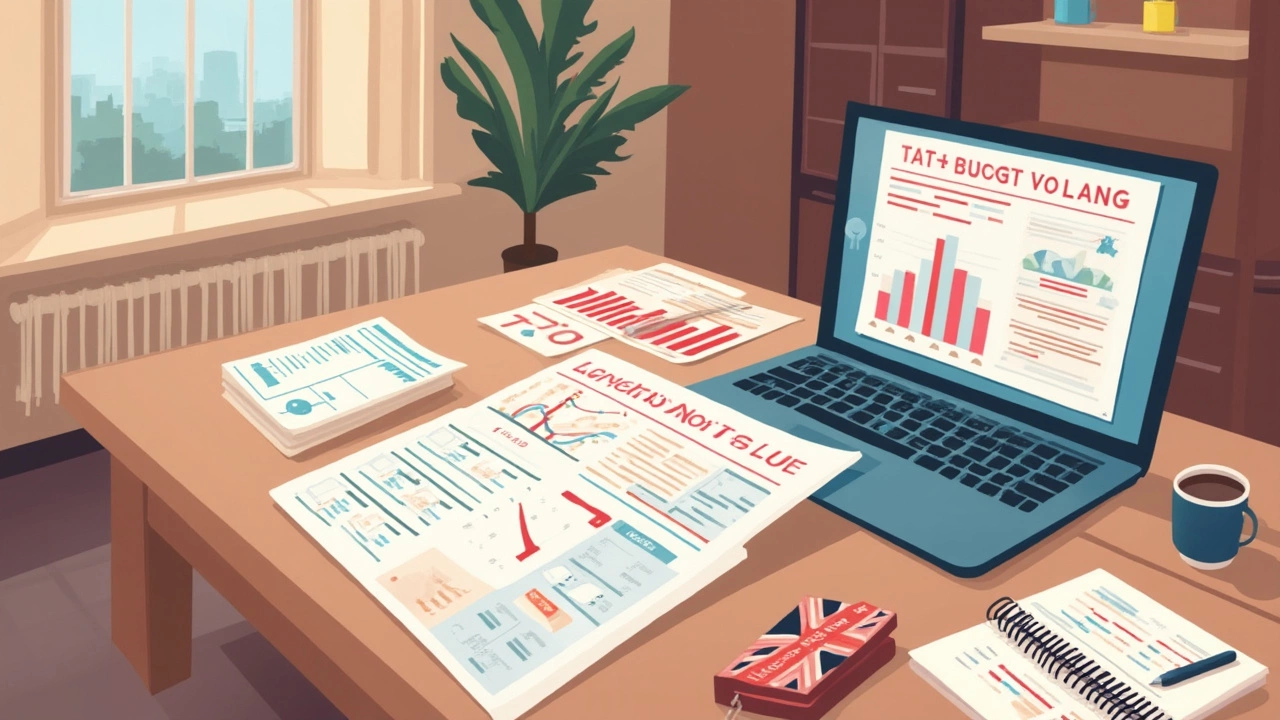So, you're making 100k a year and dreaming of buying your first home? That's awesome! But now comes the tricky part: figuring out just what you can afford. The magic number often feels like a mystery, doesn't it? Well, let's break it down into bite-sized pieces.
First things first, knowing how much you can afford starts with solid budgeting. Most experts suggest that your monthly home payments shouldn't be more than 28-30% of your gross monthly income. On 100k a year, that's roughly $2,300-2,500 a month. This range sets a good baseline but remember, what works on paper might feel different once you factor in your lifestyle and expenses.
Diving into mortgage options is the next big step. Are you gunning for a fixed-rate mortgage, or does a variable rate make more sense for your plans? Each choice has its pros and cons, affecting how much home you can comfortably afford in the end. With current rates in mind, it's smart to shop around and even chat with a mortgage advisor who gets your situation.
- Budget Basics
- Understanding Mortgage Options
- Hidden Costs to Consider
- Tips for Making the Right Purchase
Budget Basics
Setting a solid foundation for home buying starts with understanding your budget. You might be making 100k a year, but there's more to consider than just your salary. It's about how much cash you can confidently spend each month without sweating bullets every time you check your bank account.
Let’s break this down. First, grab a cup of coffee and take a close look at your monthly expenses. These include everything from groceries to that Netflix subscription. Add these up to see how much money you're really working with after all bills are paid.
Now, as a rule of thumb, housing costs shouldn't gobble up more than 28-30% of your gross monthly income. If you're pulling 100k annually, that translates to about $2,300-2,500 per month on housing. This amount includes your mortgage, property taxes, and insurance.
Want to make sure you're on track? Here's a basic checklist to keep your budget in check:
- Calculate all your essential monthly expenses. Don’t forget those sneaky subscriptions!
- Factor in savings – it’s crucial to have some buffer, ideally 20% of your income for unforeseen events or retirement savings.
- Determine what you have left to spend on a monthly house payment.
Need some handy stats? Here's a simple snapshot of what you might expect to spend upfront:
| Expense | Percentage of Total Cost |
|---|---|
| Down Payment | 20% |
| Closing Costs | 2-5% |
| Moving Costs | 1-3% |
Stick to these guidelines, and you'll not only find a home you love but also keep your stress levels in check. After all, the goal is to be a happy homeowner, not one stuck in a financial pickle!
Understanding Mortgage Options
Navigating the mortgage maze can be a bit daunting, right? But understanding the options can save you a tonne of cash and stress in the long run. Let's break it down into the basics, so you feel ready to tackle this head-on.
First up, we have the fixed-rate mortgage. This one is pretty straightforward. You lock in a rate for the entire term of your loan, usually 15 or 30 years. The biggest perk here? Predictability. Your monthly payments stay the same, making it easier to budget. This can be a rock-solid choice if you plan to stay put for a while and want to avoid unexpected cost hikes.
Then there's the adjustable-rate mortgage (ARM). This option starts with a lower interest rate, which adjusts after a set period—usually 5, 7, or 10 years. ARMs can be appealing if you're planning to sell or refinance before the period ends. But the gamble? Your payments could jump once the rate adjusts, depending on market conditions.
Before you dive in, think about your goals and pick the one that fits best with your lifestyle. Are you staying long-term or might you move in a few years? These questions are key.
If you're leaning toward an ARM, you might want to check out an example to better understand how rates can change over time. Here's a table of what a typical ARM might look like over its adjustable period:
| Period | Rate |
|---|---|
| Year 1-5 | 3.5% |
| Year 6 | 4.1% |
| Year 7+ | Varies with Market |
No matter which route you choose, digging into these details and maybe even talking to a friendly mortgage broker can make a world of difference. This isn't just about snagging any house—it's about making sure the one you buy truly becomes your home sweet home without financial headaches down the track.

Hidden Costs to Consider
Alright, you're all set to move into your new pad, but watch out! There are plenty of sneaky extra costs that can sneak up on first-time buyers like you. It's not just about the mortgage and price of the house. You've got to be ready for some added expenses along the way.
First up, let's talk about closing costs. These can add up to about 2-5% of your home's purchase price. So if you're buying a $400,000 house, that's an extra $8,000 to $20,000. These include appraisal fees, legal fees, and title insurance. It's the kind of stuff no one tells you about until you're deep in the process.
Then we've got the moving expenses. Hiring a moving company or renting a truck can quickly add up, not to mention the cost of packing supplies. Pro tip: Ask friends and family to lend a hand, or look for companies that offer deals for first-time buyers.
Maintenance and repairs are another biggie. Budgeting for unexpected repairs is smart, especially since wear-and-tear is inevitable. That cozy fireplace might need regular cleaning, or you might have to fix that plumbing clog sooner than you think. Setting aside about 1% of your home's value yearly is a good rule of thumb.
Insurance and property taxes are ongoing costs that are easy to overlook. Insurance is essential and can vary greatly based on location and coverage needs. As for property taxes, they depend on your area but can be a significant yearly expense. It's a cost that keeps on ticking long after you've unpacked your last box.
Finally, if you're buying into a community with homeowners association (HOA) fees, those can add hundreds monthly to your budget. Make sure you understand what these fees cover, whether it's maintaining shared spaces like a pool or gym, so you know what you're paying for.
| Cost | Approximate Percentage |
|---|---|
| Closing Costs | 2-5% of purchase price |
| Maintenance and Repairs | 1% of home value per year |
All these hidden costs can be a bit overwhelming at first glance. But getting a handle on them early means you'll be in way better shape to enjoy your new home without those financial headaches down the road.
Tips for Making the Right Purchase
Alright, so you're deep into the home-buying process, and now it's crunch time. Making the right choice isn't just about the house you fall in love with; it's about your future comfort and financial stability. Let's make sure you nail this!
First step, always get pre-approved for a mortgage before you start house hunting. Knowing how much you can borrow gives you a clear ceiling and stops you from getting caught up in the excitement of a place that's way over budget. Also, sellers take you more seriously, which can help in negotiations.
Next, don't skip the home inspection. It might seem like just another expense, but it’s a financial lifesaver. You wouldn't buy a used car without checking it out, right? A home inspection can reveal serious issues like bad roofing, outdated plumbing, or worse, which could turn your dream home into a money pit.
Remember those hidden costs we talked about? Factor them into your budgeting. Things like property taxes, insurance, and maintenance can add up fast. You don't want to be blindsided by these after you move in.
Also, think long-term. Ask yourself if this home will fit your life five or ten years down the road. Buying a house is a big deal, so consider things like school districts, access to public transportation, or proximity to work. Are you planning to expand your family? All these affect your decision.
It's also key to be patient. The best deals often require time and persistence. If a house is priced too high, don't hesitate to negotiate. And if it doesn't work out, there’s always another house waiting; it’s a journey, not a race.
Here's a quick glance at mortgage rates, just to have an idea of where things stand:
| Year | Average 30-Year Fixed Rate |
|---|---|
| 2023 | 3.25% |
| 2024 | 3.50% |
| 2025 | 3.75% |
Finally, trust your gut. If something feels off with a deal, it probably is. Buying a home is one of the biggest decisions you'll make, so it’s important that it feels right.


Corbin Fairweather
I am an expert in real estate focusing on property sales and rentals. I enjoy writing about the latest trends in the real estate market and sharing insights on how to make successful property investments. My passion lies in helping clients find their dream homes and navigating the complexities of real estate transactions. In my free time, I enjoy hiking and capturing the beauty of landscapes through photography.
view all postsWrite a comment